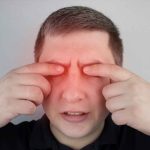Snoring is a rough or noisy sound that occurs when a person’s breathing is obstructed during sleep.
Understanding
Snoring is a harsh or noisy sound that occurs when a person’s breathing is partially or partially obstructed during sleep. Sometimes, snoring can indicate a serious health problem. In addition, snoring can be a nuisance to the partner you sleep with.
Nearly half of adults snore. Snoring occurs when airflow passes through certain tissues in the throat that vibrate when a person breathes, which causes the sound. Certain lifestyle changes, such as losing weight, avoiding alcohol before bed, or sleeping on your side, can help with snoring.
In addition, there are medical devices and surgical procedures that can be used to treat bothersome snoring. However, not everyone who snores needs it.
Snoring Reason
Snoring or snoring habits can be caused by various factors – such as the anatomy of the oral cavity and sinuses, alcohol consumption, allergies, cough and cold complaints, and body weight. When a person falls asleep and begins to transition to a deeper sleep phase, the muscles on the roof of the mouth, tongue, and throat relax.
The tissues in the throat can relax to the point of causing partial obstruction of the airway, which causes it to vibrate when air is passed through it. The narrower the airway, the higher the intensity of the airflow. With this, the vibrations that occur increase, causing the snoring to become even louder.
Some conditions that can affect the airway and cause snoring are:
- Anatomy of the mouth. Having a thick roof of the oral cavity can narrow the airway. In addition, people who are overweight can have excess tissue behind the throat which also narrows the airway. As a result, the airflow resistance becomes more and the snoring becomes louder.
- Alcohol consumption. Snoring can also be caused by excessive alcohol consumption before going to bed. Alcohol relaxes the throat muscles and reduces the body’s defenses against airway obstruction.
- Nasal disorders. A blocked nose for a long period of time or a nasal septum that is not straight can contribute to snoring.
- Lack of sleep. Not getting enough sleep can cause excessive relaxation of the throat muscles.
- Sleeping position. Snoring is most frequent and loudest when sleeping on the back, because the effect of gravity on the throat makes the airways narrower.
- Obstructive sleep apnea (OSA). Snoring can also occur as a result of OSA. In this serious condition, the throat tissues partially or completely block the airway, which impedes breathing. The presence of OSA is generally characterized by loud snoring followed by a silent phase in which breathing stops or almost stops. Over time, the pauses in breathing can wake a person up. The person may wake up gasping for air.
Snoring Symptom
Snoring is often associated with a sleep disorder known as obstructive sleep apnea (OSA). Not everyone who snores has OSA. However, if snoring is accompanied by the following signs and symptoms, this may indicate the need for further evaluation to determine whether OSA is present:
- Noisy while sleeping
- Excessive sleepiness during the day
- Difficulty concentrating
- Headache in the morning
- Sore throat
- Sleep that is not restful
- Gasping or choking at night
- High blood pressure
- Chest pain at night
- Snoring so loud that it disturbs your partner’s bedtime
- Waking up from sleep choking or gasping for air
Snoring Diagnosis
To determine a diagnosis of the condition that causes someone to snore or snore, the doctor will evaluate the signs and symptoms they are experiencing, as well as their previous medical history. In addition, the doctor will also carry out a physical examination to evaluate health conditions and ask partners about when and how snoring occurs.
Sometimes, doctors will recommend imaging investigations, such as X-rays, Computerized Tomography (CT) scans, or Magnetic Resonance Imaging (MRI) to evaluate the structure of the airway for problems, such as deviation of the nasal septum.
Depending on the degree of severity of snoring and other complaints, the doctor may suggest doing a sleep study or examination during sleep. In addition, a polysomnography examination can also be carried out, which is an in-depth analysis of sleep habits. During a sleep evaluation, things that are evaluated include brain waves, blood oxygen levels, heart rate and respiratory rate, sleep stages, and eye and leg movements during sleep.
Handling
For snoring caused by OSA, doctors can suggest several types of treatment:
- Oral apparatus that is placed in the oral cavity to support the position of the jaw, tongue, and roof of the oral cavity to keep the airway open.
- Continuous Positive Airway Pressure (CPAP). This approach involves wearing a mask over the nose while sleeping, which is connected to a small pump to push air through the airway and keep it open.
- Surgical procedure. There are several types of surgical procedures that can be performed, ranging from conventional procedures to those that use lasers.
SnoringPrevention
To prevent someone from snoring or snoring, it can be suggested to make lifestyle changes. For example by losing weight, avoiding alcohol intake before going to bed, dealing with airway obstruction, avoiding sleep deprivation, and avoiding sleeping on your back.












Add Comment